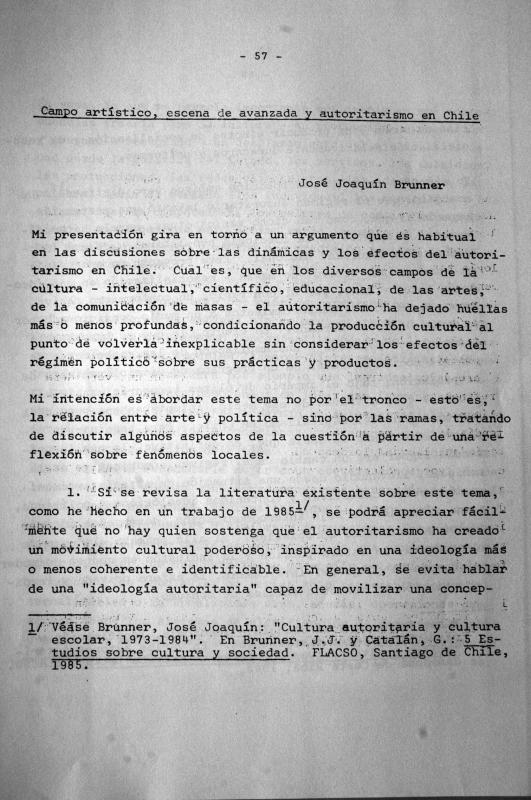“Lucha Cultural y Política” [Cultural and Political Struggle] is a text by the Chilean politician, researcher, and academic José Joaquín Brunner (b. 1944); it appeared in Ruptura: Documento de Arte (1982), which was published by C.A.D.A. (Colectivo Acciones de Arte). The publication includes the group’s manifesto and positions itself as a forum where artists and intellectuals could share their work and ideas. One of them was Brunner, the director of FLACSO (Facultad Latinoamericana de Ciencia Sociales) from 1976 to 1984. During the dictatorship, FLACSO provided an important intellectual space where authoritarianism was analyzed in terms of its impact in political, social, and cultural terms.
Brunner formed a close relationship with C.A.D.A. based on his sociological interests, paying particular attention to the group’s involvement in community spaces and places beyond the art world [For more information on this matter, see the following in the ICAA Digital Archive: “Campo artístico, escena de avanzada y autoritarismo en Chile” (doc. no. 738628).] FLACSO was all about art and culture and welcomed Margins and Institutions. Art in Chile Since 1973, the seminar presented by the cultural critic Nelly Richard (b. 1948). This event showcased two conflicting points of view: those who appreciated what Richard called the Escena de Avanzada were pitted against those who questioned its extreme isolation, its distance from the masses and the viewers.
[For other texts from the seminar with a focus on the social sciences, see: “Desmontaje y recomposición” (doc. no. 738607); and “Algunas observaciones sobre la crítica de arte en Chile” (doc. no. 741244).] The marked differences in how authoritarianism was perceived, through a fixed lens, prompted the philosopher Martín Hopenhayn (b. 1955) to write about a range of responses in his essay: “¿Qué tienen contra los sociólogos?” (doc. no. 738641).]

